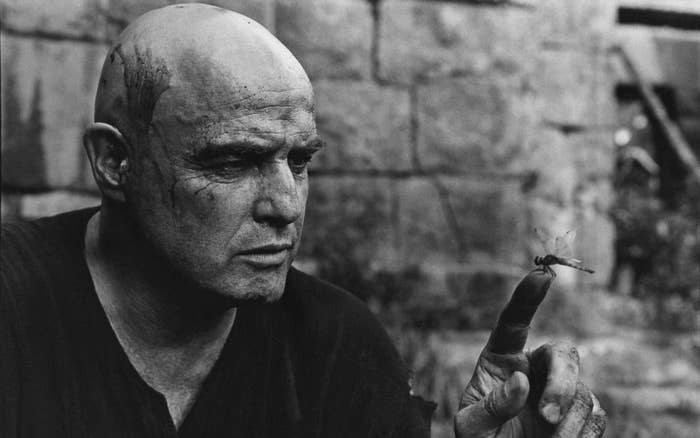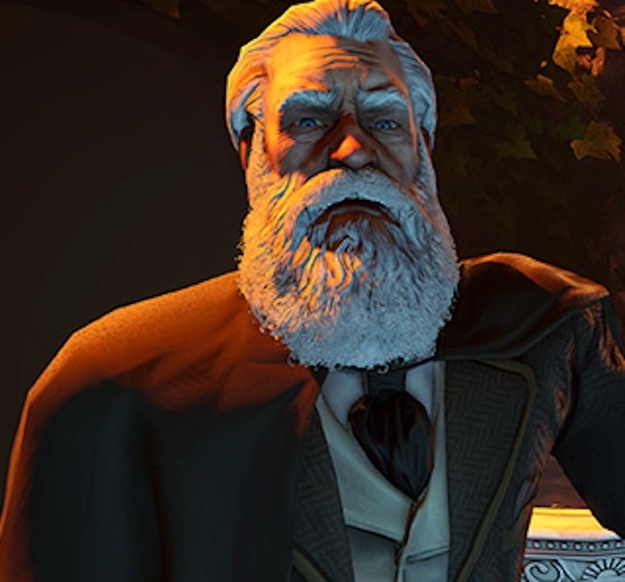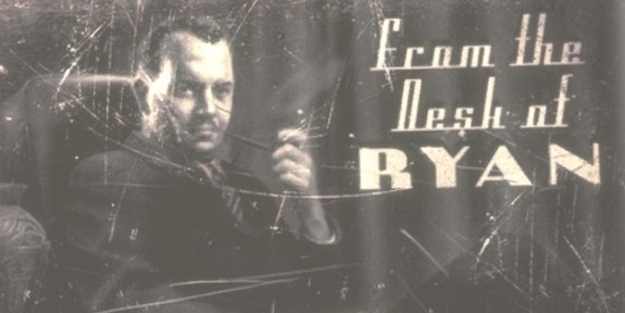When I was a freshman in college, I was assigned a paper on Heart of Darkness. The professor gave our class some advice: The problem almost everyone faces when writing about Conrad's story is that he or she starts to sound like an imitation. So seductive and rich and comprehensive are the vocabulary and syntax of Heart of Darkness, and so seductively and richly and comprehensively do they serve the structure and themes of the book, that any analysis of its structure and themes inevitably reads as bad Conrad. And using Conrad's language, the argument goes, ends up limiting the range of your own thoughts. The first step to thinking and writing originally about the book, our professor told us, was to make sure we did so in our own voice.
That sounded easy enough in class, but then you're alone with book at 3 a.m. and you're struggling to find a synonymous phrase for "the heart of the matter." You might have the kernel of something, but the going is dense, and then you start to get lost, and so you just follow the invitingly beaten path. (See how I'm doing it right now?) And it's not like my class was alone in the maze. Kurtz went down the river and went mad. Marlow tracked Kurtz down the river and went mad. Francis Ford Coppola tried to film Conrad's story on the Magdapio River and went mad. Martin Sheen followed Francis Ford Coppola down the river and went mad. Charlie Sheen suddenly starts to make sense.
Anyways, you get the idea. You start with the notion that you can follow the path of someone who confronted the same set of problems as you did but zig where they zagged and zag where they zigged. In logic, that's called Ariadne's Thread. The problem is, most of us lose the thread along the way, becoming the thing we're trying to describe or avoid.

In the two weeks since its release, BioShock Infinite has roiled the community of people who write and think about games. While much of the enthusiast community has received the game as an unqualified triumph, the more thoughtful people who work in gaming have argued over every inch of it. People have pointed out problems with its politics, its violence, its racial politics, its plot, its gaminess, its metaphysics, the way it made them feel. There has been some very good writing and a little good thinking, but I am quite sure that I have not read anything that adequately describes "the problem with BioShock Infinite." And yet I know that the game presents a problem — otherwise why would everyone be writing about it?
Heart of Darkness is as good a point as I can find to begin thinking about the dynamic of writing about BioShock and the problem it creates. Both the original game and Infinite follow the great-man-gone-mad template. Both ask the player to inhabit the role of a detective following the path of a larger-than-life leader who has gone, as Conrad puts it, "beyond the bounds of permitted aspirations." Consciously or not, but almost certainly the former (as we have been reminded ad nauseam, series creator Ken Levine was an English major at Vassar College. An English major! As if that confers some mystical power, besides the ability to scour Craigslist for cheap sublets), the BioShock games use the structure and central theme of Conrad's book.

And that's a very savvy and self-aware structure for a game to use. I mean, what are the players of most games except followers, floating down a river created by the designer? We might have the choice to row left or row right (and maybe rowing right rows us right into some rocks) but basically we've got a bounded set of decisions, and by the end of the game we'll have found whatever it is that the designer wanted us to find, we hope. Why else would we want to beat a single-player narrative game?
A lot of the writing about Infinite intuitively gets at this dynamic, even if it doesn't consider the implications. If you go through 10 or 15 pieces of critical writing about Infinite, you will find 10 or 15 turns of phrase in which Ken Levine is compared to one of his utopian villains, a half-mad creator, perhaps gone beyond the bounds of permitted aspirations in the pursuit of some principal of design to its fatal extreme. (See, I'm doing it again!) In this imagining, the player is Marlow, or Coppola, or the freshmen in my literature survey, trying to track Levine down and see what he has seen.
If you're writing about Infinite, unless you are just a jerk, you have played through the game, which means that you have inhabited this role of Levine-follower. And like, yes, as has been pointed out endlessly, BioShock Infinite is an imperfect game. But I think you'd agree that it's also a really powerful one, with a tragic momentum and payoff. (One might argue, of course, that so was Heart of Darkness, a really powerful novella that was also far, far, far from perfect.) What I'm saying is, by the time you're done with BioShock Infinite, the game has had an effect on you.
And that effect, I think, is stronger than anyone has really realized or acknowledged. Last week, game writer Leigh Alexander posted her long and thoughtful reaction to the game on her blog, and the piece is sort of being held up as the best thing anyone has written about BioShock Infinite. I don't want to pick on Alexander, or her piece, but it's just so perfectly symptomatic of this effect that I want to focus on it. The internet is full of much less literate, much less interesting commentary that shows the same signs.

The first thing I noticed about the article, which is called "BioShock: Now Is the Best Time," is that it is written at a volume of 10, the entire time. Coins "glitter madly." Ghosts "sob sepulchrally." The game is "a sterile, mechanized system that could have been ripped from any other listless hyper-modern game like a bloody spine and grafted messily onto this vision." Perhaps the intention is to produce the same feeling in the reader as the game produced in Alexander? But I think there is something more complex at work.
There's a slippage that happens during the piece, a total conflation of player and character. It's full of sentences like this: "I enter the Founders Lodge, a seat of purist disease." But, like, no. You hold a controller. You direct your first-person avatar into a digital representation of an artist's idea of what the headquarters of a racist prewar secret society in an imaginary city using magic physics to levitate would look like. A seat of purist disease? There is the sense here, to me, that the piece is not written about the game but from within the game, in the vocabulary of a stock Ken Levine character.
Then comes the most extraordinary sentence in the entire piece: "We were promised an ecosystem, morals, a message, and given thin reasoning at every juncture." We were promised! We came to Levine's utopia, and it fell short of our expectations. We were promised! I don't want to overstate the case here, but Alexander, rhetorically at least, has turned into Daisy Fitzroy, or Fontaine, an antagonist in a Ken Levine game!
And that, I think, is what is happening when we write about BioShock Infinite. It has such a strong voice, and such a strong sense of identity and purpose, and is such an intense thing to play, that when we argue with it, and about it, we become like the extremists in Levine's imaginary universes, little Ryans, little Kurtzes, whatever you like. It's most dramatic in the Alexander piece, because of her language. (In the psychosocial development of game writing, Erik Erikson would call this the adolescent phase: Identity versus Role Confusion.) But these games, which are ultimately about the power of ideas, also seem to force us to take very strong and definitive positions about games. Like: Games this smart can't be this violent! Or: A game this good can't be a first-person shooter! (I wrote that one.) Or: Any game that presents both sides like this is politically craven! Or: Exterminate the brutes! A joke.

Of course, none of these things are absolutely true. I mean, there's nothing wrong with having strong feelings about art — actually that's a very good thing — but art leaves a trace on us, on our writing and our thinking. After you watch Curb Your Enthusiasm, you sort of turn into Larry David for a few hours. After you read Hemingway, you sort of turn into Hemingway for a few hours. And the more I think about it, the more I realize that gaming leaves a particularly strong trace. As Alexander points out in her piece, games are above all systems, systems that we must physically accept to progress. To play through BioShock, you must get good at shooting. To play through a season of Madden, you must get good at passing. Even if you don't like it. The only thing you need to get through a book is the ability to read; through a movie, the ability to see and hear. Game designers make us complicit in their own decision making when we play their games. We follow them through the maze of choices.
By the time you are done with a game, then, you bear more than a little of the designer with you. And when the designer is as thoughtful and interested in ideas (and their extremes) as Ken Levine, you want to respond with your own ideas (and their extremes). The problem is that you're arguing within a set of possibilities limned by the people who made the game, along a set of decisions that they have already, deliberately, made. Inevitably these conversations become about what games can and can't, and should and shouldn't be (is there any kind of writing that moves as quickly from the specific to the universal as highbrow game writing?). But I question the value of these utopian arguments. It's kind of fruitless to say "gaming should" or "gaming shouldn't." Gaming does! It's right there in front of you!
Games are becoming indescribably diverse, stretching the elastic in the word itself. BioShock is one possibility for gaming, as it makes abundantly clear toward the end of its narrative. Let's give it the respect it deserves and say it's one of the brightest stars in the constellation of games.
But let's also take a breath, think a thought, and talk about it loud and clear, in our own voices.
CORRECTION: Ken Levine attended Vassar College. A previous version of this post misstated this fact.
